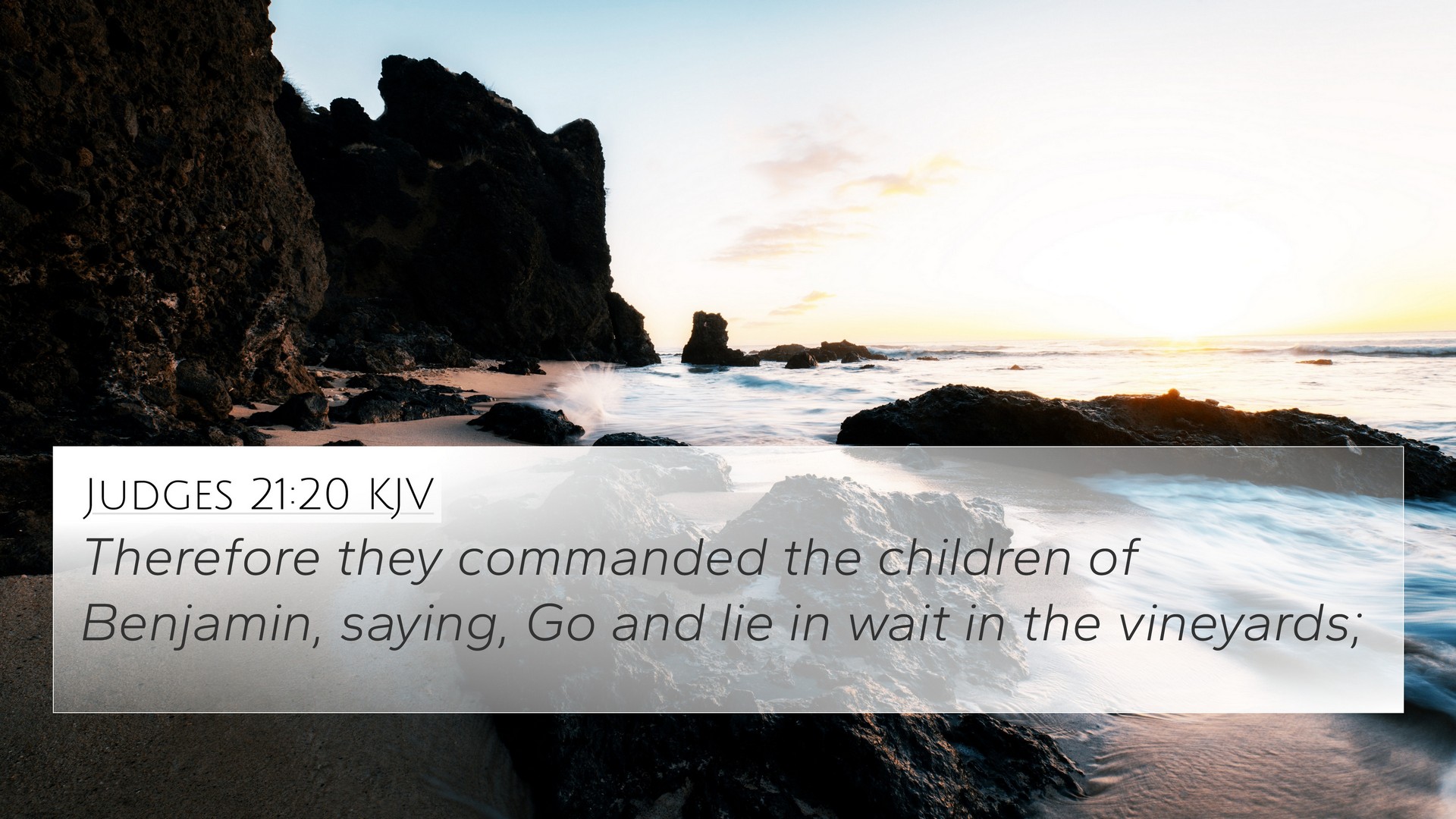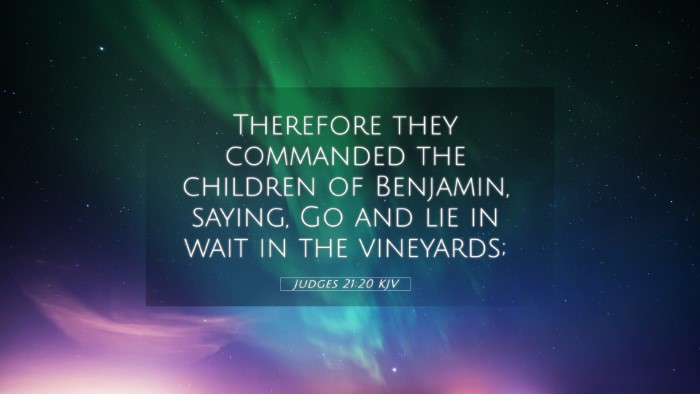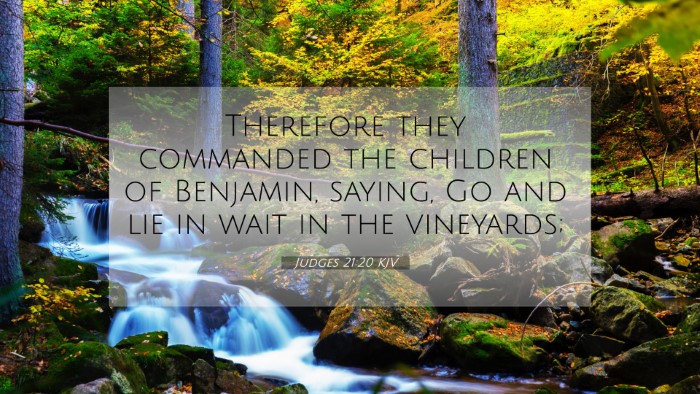Understanding Judges 21:20
Judges 21:20 states: "Therefore they instructed the children of Benjamin, saying, 'Go, lie in wait in the vineyards.'" This verse occurs in a narrative dealing with the aftermath of a civil war among the Israelites. The context is critical to understanding its implications and significance.
Contextual Interpretation
The book of Judges recounts a period of Israel's history characterized by moral decline and social chaos. In Judges 21, we witness the repercussions of the tribe of Benjamin's sin, where they had committed a grievous crime against a Levite's concubine. After a devastating conflict with the other tribes, the Benjamites are left in a precarious position, lacking women to marry as most of their population had been wiped out.
Exegesis from Public Domain Commentaries
Matthew Henry's Commentary
Matthew Henry emphasizes the dire situation for the tribe of Benjamin and how its survival depended on creative solutions. The instruction to "lie in wait" conveys a strategy rather than deceitfulness; it highlights God's providential care in ensuring that even the smallest tribe would not face extinction. Henry notes the importance of recognizing that God can work through unconventional means.
Albert Barnes' Notes on the Bible
Albert Barnes expounds on the tactical nature of the command given to the Benjamites. He points out that the suggestion to ambush in the vineyards indicates a return to cunning strategies reflective of the era's chaotic nature. Barnes further asserts that this plan illustrates the balance of divine justice and human action, wherein God's sovereign purpose is worked out through human manipulation of circumstances.
Adam Clarke's Commentary
Adam Clarke delves into the implications of vineyard settings and their symbolic meaning in the Scripture. He asserts that vineyards often represent abundance and God’s blessing. Here, the ambush planned in such a fruitful area suggests both a sign of hope for a struggling tribe and a tactical necessity due to their lack of women. Clarke invites readers to reflect on the interactions of human will and divine providence throughout history.
Bible Verse Cross-References
To better understand Judges 21:20, it can be beneficial to explore its connections and implications through cross-references. Below are some verses closely related to the themes found in Judges 21:20:
- Genesis 38:13-30 - The story of Judah and Tamar reflects themes of familial obligations and cunning plans.
- 1 Samuel 11:1-11 - Saul’s leadership strategy against the Ammonites mirrors the tactical actions of the Benjamites.
- Proverbs 1:10-19 - These verses caution against deceitful plans that lead towards destruction, providing a moral backdrop to the Benjamites' actions.
- Job 5:12 - God thwarts the plans of the crafty, demonstrating divine oversight similar to that which governs the unfolding situation in Judges.
- Matthew 10:16 - Jesus instructs His followers to be “wise as serpents,” paralleling the cunning required in Judges 21:20.
- Revelation 17:14 - Identifying clever strategies in leadership, this verse connects with the themes of conflict and ambush in Judges.
- Genesis 34:25 - The story of the Shechemites illustrates a similar ambush-driven narrative and reflects on intertribal violence.
Thematic Bible Verse Connections
The themes in Judges 21:20 allow for a broader examination of Biblical connections. The strategies employed by the Benjamites resonate throughout Scripture as instances of human agency intersecting with divine oversight.
- Divine Providence - Reflected in God’s guidance even through flawed human decisions (Jeremiah 29:11).
- Justice and Retribution - A thematic echo found in 2 Corinthians 5:10 concerning judgment based on actions.
- Family and Community - The focus on familial restoration indicates God's covenantal promises (Malachi 2:15).
Application and Study
This verse invites believers to consider how God can guide decisions in seemingly desperate circumstances. The complexities of human nature, paired with divine providence, encourage deep reflection on personal decisions and communal responsibilities in light of faith.
For those wishing to study further, employing tools for Bible cross-referencing such as a Bible concordance or a Bible cross-reference guide can unveil deeper insights into both similar and contrasting passages throughout the Scripture.
Conclusion
Judges 21:20 paints a vivid picture of survival amidst chaos and reflects on the deliberate choices made by the Benjamites. Analyzing verses through a comparative lens highlights the interconnectedness of Scripture, emphasizing key principles of faith, strategy, and divine oversight.
As one seeks to uncover Bible verses that relate to each other, it becomes essential to engage in cross-referencing Bible study methods that reveal the profound dialogues between various passages. By understanding these connections, believers can find greater meaning and application in their own lives.


